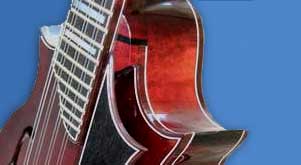|
« Left hand hover |
Main
| Enharmonic Reduction »
 February 8, 2007 | Jazzed Pentatonics February 8, 2007 | Jazzed Pentatonics
Excerpt from the TV show Seinfeld, "The Wizard:"
Morty: "Attaboy! Helen, Jerry got me a hot Wizard computer!"
Helen: "I'm right here."
Jerry: "And you can do everything with it. You can get e-mail,fax, there's a calculator."
Morty: "So, I can use it in the restaurant to figure out the tip?"
Jerry: "Yeah, I guess. But the really cool thing is the daily planner."
Morty: "Helen, we go into restaurants and figure out the tips."
Helen: "Jerry, you're getting your father too excited."
A legendary "Seinfeld" script favorite, Jerry buys his father a Wizard calculator. Unwilling to delve into its vast potential, the technology-impaired Morty comes to resolution acknowledging his son just gave him a "tip calculator." Content, he will ignore the incredible muti-faceted convenience of a pocket wizard and settle for toting a "Tip Calculator" instead.
Pentatonic Scales can be like this. At JazzMando, we're on record as largely frustrated with the folk/bluegrass community for relying too heavily on Pentatonic Scales. You know their benefit, based on five notes of the Major Scale, 1, 2, 3, 5, and 6, they offer all the safe tones, but forego the "direction notes" 4 and 7. We discussed this in greater detail in a mandolinsessions.com article in April of 2004, on "Gravity Notes," if you're unfamiliar with the concept. The Pentatonics are terrific as pedagogical training wheels, but in Jazz you really need to learn to exploit the "committal" notes of tension builders 4 and 7 if you want to say something, to give your melody direction.
That said, there are some fun things you can do with Pentatonics in jazz that you might not be aware about. If you have drilled these scales into your frets, we want to introduce you to a way of injecting them into your music as a way of voicing the upper chord extensions of some juicy chords. If we improvise these 5 notes with certain 7th chord variations, we get to voice melodically, 9ths, 11ths, and 13ths, without thinking 9ths, 11ths, and 13ths.
Here are some Pentatonic "Opportunities" for Maj7, Min7, Dom7, an m7b57 chords. Especially effective in modal jazz where the song sits on a chord for several measures, these can bend the year in an interesting but tastefully appropriate way. We've listed the 7th chord variation, the "Old School" Pentatonic scale used, and a new and improved "Upgrade." We've also noted the chord tones you infer by using the particular scale.
One suggestion, have another player comp the chord in a background first, or use some sort of "Band in a Box" software program to generate an accompaniment. Once you get comfortable with one or two chords, play along with some familiar changes like a 12-bar blues or Rhythm Changes.
In any case, open your ears and have fun!
Cmaj7
Old School: C Pentatonic C D E G A
Upgrade: D Pentatonic D E F# A B
You get: 9, (3), +11, 6, 7
Relation to root: Plus one step
Cm7
Old School: Eb Pentatonic (Cm Pentatonic) Eb F G Bb C
Upgrade: Bb Pentatonic Bb C D F G
You get: (7), (1), 9, 11, (5)
Relation to root: Down one step (up m7)
C7
Old School: C Pentatonic C D E G A
Upgrade: Bb Pentatonic Bb C D F G
Better Upgrade: Gb Pentatonic (Alt chord) Gb Ab Bb Db Eb
You get: b5, b13, b7, b9, +9
Relation to root: Plus diminished 5th (tritone)
Cm7b5
Ab Pentatonic Ab Bb C Eb F
You get: b13, b7, (1), (3), 11
Relation to root: Plus m6
Don't get stuck using Pentatonic Scales as a tip calculator!
Granted, it's more of a guitar book than mandolin, Berklee professor and jazz guitarist Bruce Saunder's book Jazz Pentatonics (Mel Bay Private Lessons Series) is a good resource for digging a little deeper into this concept. We should acknowledge some of the above was inspired/extracted from his astute but practical teaching.
Read more Tips and Tricks.
Posted by Ted at February 8, 2007 7:32 PM

Disclaimer: In the 'Information Age' of the 21st Century,
any fool with a computer, a modem, and an idea can
become a self-professed 'expert." This site does not
come equipped with 'discernment.'
|
|



